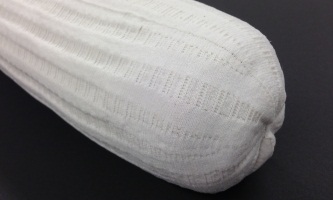Knitted, breathable prosthetic sleeves are being developed by Nottingham Trent University (NTU) researchers in an agreement with the Ministry of Defense, U.K. The sleeves improve the comfort of injured military personnel by preventing ulcers and stopping the uncomfortable build-up of perspiration between an amputee’s residual limb and the prosthesis.

The Advanced Textile Research Group at the University has used 3D knitting technology to produce seamless and breathable sleeves, worn between the residual limb and the artificial limb, which prevent sweat from being trapped in the prosthesis. Seamlessness is also important, as seams in a sleeve can cause discomfort and pressure necrosis (damage to skin tissue caused by sustained pressure).
Professor Tilak Dias, head of the research group and Professor of Knitting at Nottingham Trent University, says, “The first phase of work has been completed, demonstrating the potential for sleeves knitted with smart yarns, which have the required grip, longitudinal stiffness and transverse flexibility, which can be customized for each individual amputee. Further research will be required to optimize parameters prior to commercialization.”
Professor Dias’ research team received nearly £66,500 from the Defence Science and Technology Laboratory (Dstl) under a Centre for Defence Enterprise contract to develop the concept and prove its worth to the Ministry of Defence (MOD). On the strength of those results, Dstl is also funding the next phase. That will see the University’s team work closely with personnel from the Defence Medical Rehabilitation Centre (DMRC) at Headley Court to begin user trials which will help develop a breathable and comfortable sleeve to address the problems with present sleeves.
Earlier this month, NTU presented this technology to an audience of defense industry experts and private investors at the Centre for Defence Enterprise (CDE) Marketplace.
The technology also has the potential to improve the quality of life for amputees in the general population. Current prosthetic sleeves are constructed from textile fabrics coated with an impermeable sheet of silicone rubber. Consequently, sweat is not transported away from the skin and accumulates within the sleeve which needs to be emptied.
 TEXTILES.ORG
TEXTILES.ORG


